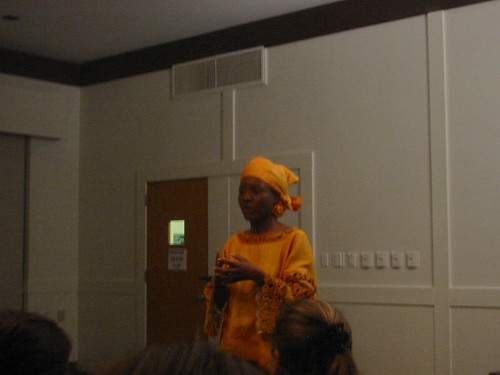Last Thursday, the Davies Forum was lucky enough to have
Ivan Chew, a librarian from
Singapore, as a guest lecturer. Ivan is a prolific blogger (with nine blogs!) and works for the Singapore
National Library Board. He was a very interesting and engaging speaker. He focused on three topics in his presentation: his
personal reasons for blogging, the
Singapore Public Library's digital experiments, and
senior citizens and blogging (follow the links for abbreviated sets of his presentation slides).
Instead of a general summary, I'm going to touch on a few points that stuck out for me.
First, I was mortified to discover that I did not know specifically where Singapore is. General area, yes, but specifically, no. I stand educated and appropriately embarrassed. In general I like to think of myself as more geographically aware than the average American (with the possible exception of U.S. geography, probably because I homeschooled). Anyway, thanks Ivan!
He talked about some of the history of blogging in Singapore, from early on when people were wary about the possibilities of inappropriate content and misinformation, to now, when the Prime Minister has encouraged people to use new media, and all National Library Board employees are required to take new media classes. They even did a call for citizen journalists to cover the closure of one of their libraries. This was interesting and very cool. They (Ivan especially) are recognizing the importance and potential of new media.
I especially like how the libraries are using the blogs to "publicize" and "engage." I love libraries and I love the internet, so I was glad to see the successes that they are having in meshing the two together. I asked him what he thought about the future of the (paper) book, and he asked whether it matters. Very interesting point, and one that's come up in a slightly different context in our class discussion - how important is the medium of the information? Aren't the content and the way we read it the most important? Of course, the medium is related to those, but maybe we shouldn't get caught up on whether a word is made of pigment and fiber or 1's and 0's.
Since Ivan works with young people, someone asked what age he thought kids should be introduced to the internet. He said "As soon as they have something to say." So cool! It's a shift from when I first began to use the internet, when I was 10. Back then, everything was about cybersafety, not getting "lost" on the information superhighway (that never made sense to me), and always asking a parent's permission. Cybersafety for kids is still really important, but his response is a shift from "old enough to know better than to give an ax-murderer her address" to "old enough to participate and create." I love it!
He talked about a conversation he had in which someone asked him if he thought there would ever be a point when there were no more wars. His response was no, but they could be a lot fewer and far-between if the memory of the horrors of war stayed in people's consciousness for longer. This, to me, is an excellent reason for people, especially senior citizens, to blog, and is an excellent reason for us to blog about the war in Iraq. And then when we're old (or probably before then), and the U.S. is trying to get into another ridiculous war, let's look back through our blog archives, remind ourselves what a bad idea war is, and do something to stop it.
And finally he closed his presentation with a cool music video that he made,
Dolphins Galaxia.Here's a nice picture of Ivan,
Professor Silver, and a librarian from the USF
Gleeson Library.





 Bryan Alexander works for NITLE, focusing on use of technology in education. This is completely interesting and awesome. He talked about some of the great collaborative tools in Web 2.0, including collaborative writing and collective research. He said that there is a shift in the model of learning from individual experts to learning through networks (connectivism). This reminded me of this article on categorization and tagging, which describes the limitations of structured, institutionalized categorization (as we have in libraries), and some of the ways that tagging can change this. I have more thoughts on this article, which I will talk about later, but it's the same concept of collective creation.
Bryan Alexander works for NITLE, focusing on use of technology in education. This is completely interesting and awesome. He talked about some of the great collaborative tools in Web 2.0, including collaborative writing and collective research. He said that there is a shift in the model of learning from individual experts to learning through networks (connectivism). This reminded me of this article on categorization and tagging, which describes the limitations of structured, institutionalized categorization (as we have in libraries), and some of the ways that tagging can change this. I have more thoughts on this article, which I will talk about later, but it's the same concept of collective creation.
